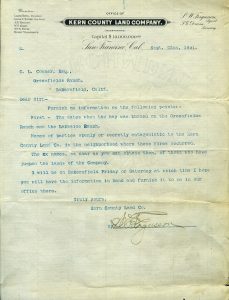Back when water barons hired undercover agents
- By LOIS HENRY, The Bakersfield Californian lhenry@bakersfield.com
Indulge me while I share a fascinating fragment of Kern County history. And, wouldn’t ya know, it has to do with water, sort of.

As anyone who’s read my columns knows, I love any and all info related to the Kern River.
So, when Kern County Museum Curator Lori Wear told me last year she was getting a cache of old documents from Castle & Cooke, I was all ears.
In case you don’t know, Castle & Cooke is the descendant company of Tenneco West, which was the descendant of the Kern County Land Co. And no two entities were more intertwined than the Kern River and the Kern County Land Co.
Yes! I told Wear, lemme know what you find.
She and her staff are still going through the massive document trove, but Wear alerted me to one shiny gem that caught her eye. It’s a series of letters from 1891 about the hunt for desperate criminals marauding the countryside burning hay stacks. Not just any hay stacks but those belonging to Kern County Land Co.
The letters are between the Land Company and a private detective firm in San Francisco.
First, the letters are a wonderful peek into Kern County life at the turn of the last century. Second, and more importantly, they clearly show a level of animosity and intrigue you just won’t find in textbooks.
In mid- and late-August 1891, 10 hay stacks were torched on two properties owned by the Land Company.
Why is that a big deal?
Hay stacks back then were enormous. And without a store of hay, the Land Company couldn’t feed its livestock. That’s money on the hoof.
Aside from that, the Land Company was ever vigilant against disgruntled settlers and others unhappy with how much land — and water rights — the company was gobbling up.
The Land Company’s response to these hay burners was quick and decisive. But, interestingly, not local.
If the Land Company did call local authorities, it didn’t give them much time to solve the case.
About a month after its stacks were torched on Aug. 16 and Aug. 20, 1891, the Harry N. Morse detective agency in San Francisco already had a man on the ground in Fresno preparing to infiltrate the hay arsonist’s ranks.
Morse was a legendary Bay Area lawman known as the “bloodhound of the far west.”
A Land Company boss, S.W. Ferguson, had discovered the names of about half a dozen locals who he believed might be the hay torching culprits. That included “Old man Emerson of the Paletta Ranch,” according to a letter he sent to Morse’s agent, known only as “Operative H.H.”
“Emerson was at one time arrested at the instigation of the Company for cutting water pipes and was in jail for a while on account of this,” Ferguson wrote.
See? It all comes back to the water.
Anyhow, the hay burning was taken extremely seriously by Ferguson who not only wanted to know who burned the hay, but also anyone who had been “… openly or secretly antagonistic to the Kern County Land Co.”
According to Operative H.H.’s reports, he too, was all in.
In his first report from Fresno, H.H. mentions how he and his wife, yes, his wife, had traveled by train from San Francisco and went about getting a wagon, team of horses and camping gear. Not too expensive, nor too cheap looking.
After haggling over the price of horses and covering the wagon himself rather than pay the “exorbitant” price of $15 for stable hands to do it, H.H. and his wife got underway to Bakersfield on Sept. 27, 1891.
Three days later, they arrived in Bakersfield.
“We put up at the Arlington Hotel. We did not care to go to a first class hotel, as we wished to avoid suspicion, and we had the appearance of first-class ‘hay-seeds,’ and not wishing to change our appearance, we concluded to stop at a second class hotel,” H.H. writes in a report dated Sept. 30, 1891. (His reports are all type written, by the way, so, he must have squirreled away a typewriter among his hay seed trappings.)
H.H.’s next report is dated Oct. 4, 1891.
He spends some time roaming around town asking about land for sale and gets some good intel via a time honored technique: “I have found that by the use of some stimulants in the shape of beer, they loosen up considerably.”
He also lets the locals know he’s not a fan of the Kern County Land Co. He meets a man named Charles Scribner, who has connections to a real estate agent named Mr. Maude (likely A.C. Maude, who also dabbled in insurance and owned the weekly Californian newspaper for a time).
Scribner joins in the Land Company bashing, H.H. reports.
“… he frequently alluded to the Land Company as monopolists, and some very endearing terms were used by him against the Land Company. He also said that the Company had ‘spotters’ around, and if there was anyone in town looking for land these ‘spotters’ would inform the person that he would get swindled if he purchased from him, or Maude, or anyone but the Land Company.
“Mr. Scribner said that the Land Company would do anything to dispose of its worthless land.”
H.H. does meet with Mr. Maude, who warns him against bad mouthing the Land Company, which controls the water and could make things “very bad for me.”
H.H.’s next report goes even deeper into dark history of land and water in Kern.
But I’ve run out of room so you’ll have to check back next week to hear how it ends.
Opinions expressed in this column are those of Lois Henry. Her column runs Wednesdays and Sundays. Comment at http://www.bakersfield.com, call her at 395-7373 or email lhenry@bakersfield.com
